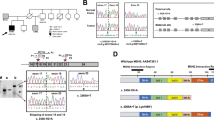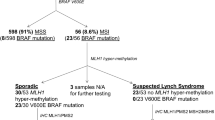Abstract
Some patients happen to have a colorectal cancer with microsatellite instability (MSI), but without any alteration in Mismatch Repair (MMR) system (germline mutation/promoter methylation). We aimed to identify the mechanism of inactivation of MMR genes in those cases. We studied 18 patients with MSI CCR and loss of expression of a MMR protein. DNA was extracted from tumoral and normal colonic material. We studied the 3 main MMR genes in tumors, by sequencing and large rearrangement analysis, and looked for mosaicism. Seven patients lost expression of MLH1, we found 1 mutation in the tumor for 3 patients and 2 mutations in one. Eight patients lost expression of MSH2: we found 1 mutation in 2 patients and 2 mutations in four. In the 5 cases with 2 hits, MSI was due to double somatic hits (n = 3), mosaicism (n = 1) and missed germline mutation (n = 1). Mosaicism was confirmed by HRM analysis, and by finding a germline mutation in one patient’s son. We could explain MSI in the tumors of 5 patients (27.8 %). Their follow up and family’s surveillance could be adjusted, as the sporadic cases don’t require intensive surveillance. We describe the first case of somatic mosaicism after de novo mutation in MSH2.


Similar content being viewed by others
References
Imai K, Yamamoto H (2008) Carcinogenesis and microsatellite instability: the interrelationship between genetics and epigenetics. Carcinogenesis 29(4):673–680. doi:10.1093/carcin/bgm228
Boland CR, Goel A (2010) Microsatellite instability in colorectal cancer. Gastroenterology 138(6):2073–2087 e2073. doi:10.1053/j.gastro.2009.12.064
Perez-Carbonell L, Alenda C, Paya A, Castillejo A, Barbera VM, Guillen C, Rojas E, Acame N, Gutierrez-Avino FJ, Castells A, Llor X, Andreu M, Soto JL, Jover R (2010) Methylation analysis of MLH1 improves the selection of patients for genetic testing in Lynch syndrome. J Mol Diagn 12(4):498–504. doi:10.2353/jmoldx.2010.090212
Parc YR, Halling KC, Burgart LJ, McDonnell SK, Schaid DJ, Thibodeau SN, Halling AC (2000) Microsatellite instability and hMLH1/hMSH2 expression in young endometrial carcinoma patients: associations with family history and histopathology. Int J Cancer 86(1):60–66
Watson P, Riley B (2005) The tumor spectrum in the Lynch syndrome. Fam Cancer 4(3):245–248. doi:10.1007/s10689-004-7994-z
Vasen HF, Mecklin JP, Khan PM, Lynch HT (1991) The International Collaborative Group on hereditary non-polyposis colorectal cancer (ICG-HNPCC). Dis Colon Rectum 34(5):424–425
Rodriguez-Bigas MA, Boland CR, Hamilton SR, Henson DE, Jass JR, Khan PM, Lynch H, Perucho M, Smyrk T, Sobin L, Srivastava S (1997) A National Cancer Institute workshop on hereditary nonpolyposis colorectal cancer syndrome: meeting highlights and Bethesda guidelines. J Natl Cancer Inst 89(23):1758–1762
Ewald J, Rodrigue CM, Mourra N, Lefevre JH, Flejou JF, Tiret E, Gespach C, Parc YR (2007) Immunohistochemical staining for mismatch repair proteins, and its relevance in the diagnosis of hereditary non-polyposis colorectal cancer. Br J Surg 94(8):1020–1027. doi:10.1002/bjs.5704
Peltomaki P (2005) Lynch syndrome genes. Fam Cancer 4(3):227–232. doi:10.1007/s10689-004-7993-0
Lynch HT, Lynch JF, Lynch PM (2007) Toward a consensus in molecular diagnosis of hereditary nonpolyposis colorectal cancer (Lynch syndrome). J Natl Cancer Inst 99(4):261–263. doi:10.1093/jnci/djk077
Vaughn CP, Robles J, Swensen JJ, Miller CE, Lyon E, Mao R, Bayrak-Toydemir P, Samowitz WS (2010) Clinical analysis of PMS2: mutation detection and avoidance of pseudogenes. Hum Mutat 31(5):588–593. doi:10.1002/humu.21230
Vasen HF, Moslein G, Alonso A, Bernstein I, Bertario L, Blanco I, Burn J, Capella G, Engel C, Frayling I, Friedl W, Hes FJ, Hodgson S, Mecklin JP, Moller P, Nagengast F, Parc Y, Renkonen-Sinisalo L, Sampson JR, Stormorken A, Wijnen J (2007) Guidelines for the clinical management of Lynch syndrome (hereditary non-polyposis cancer). J Med Genet 44(6):353–362. doi:10.1136/jmg.2007.048991
Julie C, Tresallet C, Brouquet A, Vallot C, Zimmermann U, Mitry E, Radvanyi F, Rouleau E, Lidereau R, Coulet F, Olschwang S, Frebourg T, Rougier P, Nordlinger B, Laurent-Puig P, Penna C, Boileau C, Franc B, Muti C, Hofmann-Radvanyi H (2008) Identification in daily practice of patients with Lynch syndrome (hereditary nonpolyposis colorectal cancer): revised Bethesda guidelines-based approach versus molecular screening. Am J Gastroenterol 103(11):2825–2835; quiz 2836. doi:10.1111/j.1572-0241.2008.02084.x
Canard G, Lefevre JH, Colas C, Coulet F, Svrcek M, Lascols O, Hamelin R, Shields C, Duval A, Flejou JF, Soubrier F, Tiret E, Parc Y (2011) Screening for Lynch syndrome in colorectal cancer: are we doing enough? Ann Surg Oncol. doi:10.1245/s10434-011-2014-7
Ullman TA, Itzkowitz SH (2011) Intestinal inflammation and cancer. Gastroenterology 140(6):1807–1816. doi:10.1053/j.gastro.2011.01.057
Zhang R, Qin W, Xu GL, Zeng FF, Li CX (2012) A meta-analysis of the prevalence of somatic mutations in the hMLH1 and hMSH2 genes in colorectal cancer. Colorectal Dis 14(3):e80–e89. doi:10.1111/j.1463-1318.2011.02858.x
Pastrello C, Fornasarig M, Pin E, Berto E, Pivetta B, Viel A (2009) Somatic mosaicism in a patient with Lynch syndrome. Am J Med Genet A 149A(2):212–215. doi:10.1002/ajmg.a.32620
Win AK, Jenkins MA, Buchanan DD, Clendenning M, Young JP, Giles GG, Goldblatt J, Leggett BA, Hopper JL, Thibodeau SN, Lindor NM (2011) Determining the frequency of de novo germline mutations in DNA mismatch repair genes. J Med Genet 48(8):530–534. doi:10.1136/jmedgenet-2011-100082
Lefevre JH, Colas C, Coulet F, Bonilla C, Mourra N, Flejou JF, Tiret E, Bodmer W, Soubrier F, Parc Y (2010) MYH biallelic mutation can inactivate the two genetic pathways of colorectal cancer by APC or MLH1 transversions. Fam Cancer 9(4):589–594. doi:10.1007/s10689-010-9367-0
Kobelka CE (2010) Exome sequencing: expanding the genetic testing toolbox. Clin Genet 78(2):132–134. doi:10.1111/j.1399-0004.2010.01452_1.x
Conflict of interest
Each author has no conflict of interest to report.
Author information
Authors and Affiliations
Corresponding author
Rights and permissions
About this article
Cite this article
Sourrouille, I., Coulet, F., Lefevre, J.H. et al. Somatic mosaicism and double somatic hits can lead to MSI colorectal tumors. Familial Cancer 12, 27–33 (2013). https://doi.org/10.1007/s10689-012-9568-9
Published:
Issue Date:
DOI: https://doi.org/10.1007/s10689-012-9568-9




